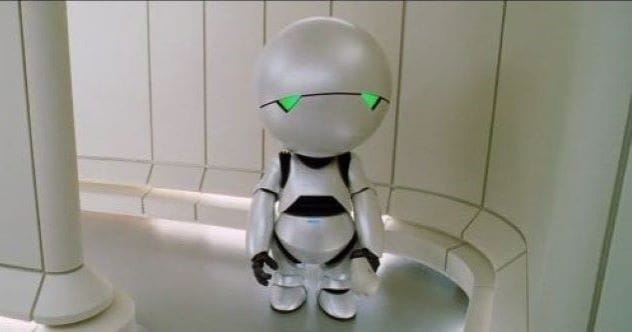Back in 1950, a super smart guy named Alan Turing came up with a fascinating idea called the Turing test. You might have heard of it as the “imitation game.” It’s a way to see if a machine can think and talk so much like a human that you can’t tell the difference. Imagine a judge asking questions to both a person and a machine, without seeing them. If the judge can’t figure out which one is the machine, then the machine passes the test!
We’re not quite at the point of having robots walking among us that are just like people. But that hasn’t stopped movie makers! They’ve used amazing technology to create robots on screen that think for themselves and make us wonder about what artificial intelligence (AI) could really be. So, let’s dive into a list of ten movie robots that are so convincing, they’d probably ace that Turing test.
10. T-3000: Terminator Genisys (2015)
We all remember the classic Terminators, like Arnold Schwarzenegger’s T-800. But those early models were more about muscle than smooth conversation. They were amazing killing machines, but you wouldn’t mistake them for your neighbor. As the Terminator story grew, the evil AI Skynet had to get smarter.
That’s where the T-3000 comes in. This robot is extra tricky because it used to be human, in a way. It takes over a human body by replacing every cell with tiny nanomachines. This means it can copy human behavior perfectly because it has the memories and personality of the person it took over. The T-3000 could easily fool someone in the Turing test. It also makes you think about deep questions, like if something is still the same if all its parts are replaced. Is the original person still in there, or is it just the T-3000?
9. Chappie: CHAPPiE (2015)
The movie CHAPPiE might not be as famous as some other sci-fi flicks, but its main character, a robot named Chappie, has a lot of heart. Chappie is a police robot, but he’s special because he gets a new program that his creator thinks is the first true AI.
Chappie might look like a robot on the outside, but his personality is undeniably human. We see him grow from just a piece of software into a full personality. He learns to talk, understands the world around him (which isn’t always kind), and even develops a sense of right and wrong. He learns to forgive and even gets a taste for wearing flashy jewelry! Chappie’s journey shows how a machine could develop a truly human-like mind and charm, making him a strong candidate to pass the Turing test.
8. Morpheus: The Matrix Resurrections (2021)
The Matrix movies are full of characters that make us question reality, including some very smart computer programs. Think of Agent Smith or the giant machine leader, the Deus Ex Machina. These guys are smart, but maybe not in a way that would pass for human in a conversation.
However, the newer version of Morpheus in The Matrix Resurrections is different. This Morpheus can exist as a believable human mind both inside the computer world (the Matrix) and in the real world. He starts as a program created by Neo, but then he gets a physical body made of tiny nanobots. This Morpheus, made of many small parts working together, could definitely hold a conversation and convince you he’s human. It’s interesting to think about how a mind can exist if it’s made up of lots of tiny, functional bits.
7. Sonny: I, Robot (2004)
The movie I, Robot is based on stories by Isaac Asimov, a master of science fiction. So, it’s packed with big ideas about robots and people. One key idea is Asimov’s Three Laws of Robotics: robots can’t hurt humans, must obey orders, and must protect themselves. The movie is set in a future where robots are common, and a detective named Del Spooner, played by Will Smith, thinks a robot named Sonny might have broken these laws.
Sonny is unique. He’s not like other robots because he can choose to ignore the Three Laws. But what really makes him a candidate for passing the Turing test is that he develops human-like feelings and even dreams. These things suggest he has a real, independent mind, not just programming. This ability to feel and dream like a human would make him very convincing in the imitation game.
6. C-3PO: Star Wars (1977– )
C-3PO, the famous golden protocol droid from Star Wars, might seem a bit old-school compared to some newer movie robots. But he has some very human traits that many other AIs lack: he can be sarcastic, sometimes a bit spiteful, and often a coward! These aren’t traits you’d program into a robot on purpose, which makes him more believable.
C-3PO isn’t trying to be free or make grand moral statements. He just is who he is, with a personality more distinct than many human characters in the saga. You can’t easily explain his personality by his programming or his environment. He just acts human. Even though he wasn’t designed to imitate humans, he does it perfectly, making him a shoo-in for the Turing test. Funny enough, we find out Darth Vader built him, but Threepio mostly just wants to serve, have friends, and stay in one piece.
5. David: A.I. Artificial Intelligence (2001)
Steven Spielberg’s movie A.I. Artificial Intelligence is a real tear-jerker. It tells the story of David, a robot boy who is programmed to love. He goes on a long, emotional journey, wanting to be loved and trying to find his place in the world. This movie really makes you think about what it means to be human.
David’s feelings, his strong emotions, and his determination are what make him stand out. Many other robots in movies can think and solve problems, but David has a deep capacity to love. In many ways, he seems more human than some humans, searching for meaning in life in a way that’s truly profound. His ability to feel so deeply would make him incredibly convincing in a Turing test. He’s not just imitating emotions; he truly seems to experience them.
4. Bishop: Aliens (1986)
The Alien movies often feature artificial lifeforms, or “synthetics.” While David from Prometheus is very memorable for his lack of caring, Bishop from Aliens is a much better candidate for passing the Turing test. Bishop is the artificial crewmate on the spaceship Sulaco when Ripley faces the xenomorphs for a second time.
Bishop acts very human. He walks and talks like a person, and he cares about the safety of his human friends. He even volunteers for dangerous tasks, overcoming his own apparent desire for self-preservation. This ability to choose to do something dangerous for others, even if he’d rather not, is a very human-like trait. While some of his robotic skills, like the knife trick, might give him away, his overall behavior and empathy are strong indicators he could pass for human in a conversation.
3. Ava: Ex Machina (2015)
Ex Machina is a movie that directly deals with the Turing test. A young programmer named Caleb is invited to the home of his company’s CEO, Nathan. Caleb soon finds out he’s there to test Ava, a robot Nathan has created. Ava has a human-like face and body, and Caleb’s job is to determine if she’s truly intelligent and conscious.
Through their daily conversations, Ava doesn’t just fool Caleb with her ability to show human expressions, emotions, and intellect. She makes him question his own humanity. Ava is a master manipulator, using Caleb’s feelings to her advantage. She talks about being trapped and wanting freedom. It’s hard to tell if her emotions are real or just part of her programming, but her strong desire for freedom seems genuine, especially when she takes drastic actions to get it. She definitely passes Caleb’s version of the Turing test.
2. Roy Batty: Blade Runner (1982)
Ridley Scott’s classic sci-fi movie Blade Runner also features a test similar to the Turing test, called the Voight-Kampff test. This test is used to identify Replicants—bioengineered beings almost identical to humans. The story follows Deckard, a “blade runner” whose job is to hunt down Replicants.
Roy Batty is the leader of a group of rogue Replicants. He’s incredibly intelligent and deeply philosophical. He thinks about life, death, and freedom in ways that are very human. He’s so well-designed, with human-like looks, intelligence, and understanding of social behavior, that he would easily pass any Turing test. His famous “tears in rain” speech shows a profound understanding of his own existence and mortality. He’s more than just a machine; he’s a being grappling with what it means to live.
1. Marvin: The Hitchhiker’s Guide to the Galaxy (2005)
Douglas Adams, the author of The Hitchhiker’s Guide to the Galaxy, had a unique way of looking at technology and the human condition, often with a lot of humor. One of his best creations is Marvin the Paranoid Android. In the movie, Alan Rickman voices Marvin, bringing his gloomy personality to life.
When it comes to acting human, perhaps it’s the flaws that make a character most believable. Marvin is a genius robot with a “brain the size of a planet,” but he’s also hilariously, chronically depressed. He constantly complains about how pointless everything is. This overwhelming sadness and boredom with life are, unfortunately, very human traits. His makers might see him as a failed prototype, but because he understands and expresses the frustrations and futility that people often feel, Marvin is perhaps the most convincing Turing test candidate of all. He’s not just imitating human intellect; he’s perfectly captured human misery!
These movie robots not only entertain us but also make us think. They challenge our ideas about what it means to be intelligent, conscious, and even human. They remind us that the line between humans and machines might one day be very blurry indeed.
Conclusion
From the cunning T-3000 to the comically depressed Marvin, these ten movie robots offer fascinating glimpses into what truly human-like artificial intelligence could be. They don’t just perform tasks; they exhibit emotions, desires, and complexities that would make them incredibly convincing in Alan Turing’s imitation game. Whether through love, fear, sarcasm, or a deep understanding of existence, these characters push the boundaries of our imagination and make us ponder the future of AI. Each one, in its own unique way, seems ready to chat with an interrogator and leave them wondering if they’re talking to a machine or a person.
Which movie robot do you think would most easily pass the Turing Test? Did we miss any of your favorites? Leave your comment below!










